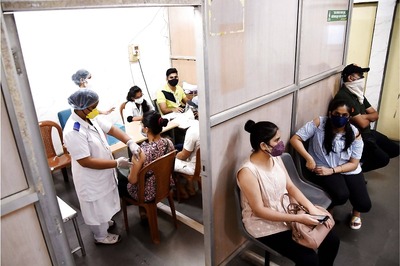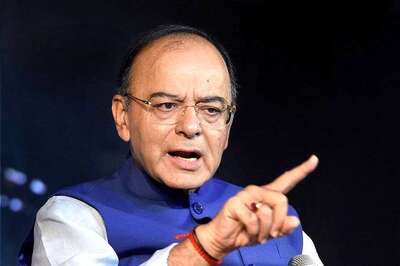
views
Just a week ago, Danish officials confirmed that they will be doing away with more than 1.1 million doses of COVID-19 vaccines as their efforts to give them to other countries have failed. While on one hand, several rich countries like Denmark have vaccines in surplus, on the other hand, The Duke Global Health Innovation Centre has estimated that the majority in low-income countries will have to wait until 2023 to be vaccinated.
In the last two years, the world has seen and gone through a lot of difficulties together. Never has there been a situation in recent times, when no one around was safe. As we saw the extraordinary becoming ordinary and the emergence of new variants bringing even the most powerful economies to their knees and putting everyone at risk, vaccine development and distribution remained the only signs of hope. However, an equitable supply of vaccines had not been the intent and priority of many countries. A nationalistic or “my country first” approach towards vaccination acquirement and distribution has failed the idea of “Health for All”. As lives seem to go back to normalcy, it is now that we realise the biggest lesson that the pandemic has taught us is that “Vaccine Nationalism” does harm and no good.
What is Vaccine Nationalism
Vaccination nationalism occurs when a government acquires doses through a pre-purchased arrangement with the manufacturer, prioritising its own people while limiting vaccine access in other countries. Peter Marks, who directed the early stages of vaccine development in the United States, compared vaccine distribution to wearing oxygen masks during a flight, saying, “You put on your own first, and then we want to aid others as rapidly as possible.” This method, in which wealthy countries acquire vaccines in excess, leaving poorer countries to suffer, is also known as the “every nation to itself” approach.
Also Read: From Libya to Afghanistan and Syria, Covid Vaccination Rates in War-Torn Nations Are Alarmingly Low
Rich nations such as Canada and Switzerland amassed more than four to seven times the amount needed to inoculate their entire population through bilateral/multilateral supply agreements excluding COVAX. Greece, France, the United Kingdom, Germany, and several other countries have joined them. Decisions like these put manufacturing companies in jeopardy of meeting their equal distribution targets. According to data, these agreements have left low-income countries like Malawi, South Sudan, Togo, and others behind.
Vaccine Nationalism before COVID-19
While the phrase has gained attention in the past two years, it isn’t the first time that rich countries have done this. During the 2009 Swine Flu pandemic which was caused by H1N1 influenza virus, many rich countries had gotten into agreements with manufacturing units to get the initial supplies. These prevented vaccines from reaching people from middle and low-income countries on time. Although some of these nations came forward to help the lesser developed ones, they only did so after ensuring their populations had gotten the dosage.
Also Read: Amid Covid Pandemic, Tuberculosis Patients Are Becoming a Casualty of Neglect
Even for HIV-AIDS which is said to have led to over 3 lakh preventable deaths in Africa from 2000-2005, the delayed reach of antiretroviral therapy was the biggest reason. With vulnerable countries often receiving late access to treatments, it is sure that we attach lower values to the lives of their people.
“My Country First” Approach is Self Defeating
Many ought to believe that vaccine nationalism is just morally reprehensible. Even though on moralistic grounds it is wrong, that is not the only virtue. Hoarding of vaccines by several countries and as a consequence disrupted global supply chains has exposed the fact that manufacturing units have limited capacities. Some experts have previously stated that the “herd immunity” once achieved can help in putting a halt to the pandemic, keeping in mind that the herd immunity will only be achieved when 70% of the world population is vaccinated. Hoarding has been shown to delay this. More shattered and overburdened health systems give birth to a perfect environment for new variants to emerge and sustain.
Furthermore, if economies shut down in poorer nations or if their people are sick and dying of the disease, it will definitely impact the running of rich nations as well. In the world of global interdependence and cooperation, no one can become the sole winner of the race.
The Best Medicine is Vaccine Equity
The need for “Health for all” has never been felt more urgently than ever before. This might not be the last pandemic we are facing. But our experiences in this one thus far have taught us that we have to fight the health wars together. We need more accelerator programmes like WHO’s COVAX initiative which aims to accelerate the development and manufacture of COVID-19 vaccines, and guarantee fair and equitable access for every country in the world. Only the principle of equity can help in building a safety net for all.
We need more countries producing vaccines at lower prices. Sharing of technology can help to achieve equity. The agreement between AstraZeneca and the Serum Institute of India to produce the vaccine for developing countries at a lower price is an example of partnerships we need.
No real winners: no one is safe until everyone is safe
We are yet to discover many more things about the virus and its variants. While we are in the midst of it, only a global cooperation strategy will help us all get out of this safely. Not only for Coronavirus, but for other diseases as well, a self-interested hoarding strategy will only prolong its existence. The bottom line is that everyone will lose if one loses.
Mahek Nankani is Assistant Programme Manager at The Takshashila Institution. The views expressed in this article are those of the author and do not represent the stand of this publication.
Read all the Latest Opinions here



















Comments
0 comment